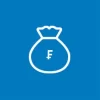Savings account interest rates continue to fall. Migros Bank and the cantonal banks of Aargau, Basel-Landschaft and Zug are among the banks which slashed interest rates at the start of 2020.
The median savings account annual interest rate for adult is currently still 0.05% per year. The median annual interest rate for pillar 3a retirement accounts is also low, at 0.15% per annum. Vested benefits accounts also have a median interest rate of 0.05% per annum. The average private account no longer yields any interest at all.
Do savings accounts still make sense?
The constantly dwindling interest on savings has boosted the position of those who believe that savings accounts no longer make sense. Some vocal savings account critics recommend transferring balances to private accounts as these have fewer limitations than savings accounts. The argument is that the difference in interest between savings accounts and private accounts is negligible.
That may be true for average savings accounts. “But even in the current historical low-point for interest rates, savings accounts continue to make financial sense. There are savings accounts which yield interest at rates well above median rates – and not only youth savings accounts. Comparing interest rates can pay off,” believes moneyland.ch CEO Benjamin Manz.
Rate differences between savings accounts
An increasing number of banks have been reducing their savings account interest rates to 0% per annum. These include UBS and the Zuger Kantonalbank. But on the other end of the scale, you will find savings accounts for adults with interest rates as high as 0.7% per annum.
Unfortunately, the highest-yield savings accounts often have requirements or limitations attached. For example, the Bonviva Platinum savings account from Crédit Suisse which has a 0.4% annual interest rate is only offered as part of a paid Bonviva Platinum banking bundle. The CA Energy savings account from Crédit Agricole has a 0.3% annual interest rate, but this rate only applies to the first 50,000 francs and a 6-month notice period for larger amounts.
Some high-yield savings accounts have additional requirements such as ongoing annual deposits. The bonus savings account from WIR Bank yields up to 0.7% interest per annum – but only for account holders who own WIR Bank shares and make minimum additional deposits of 5000 francs per year. All of these factors are accounted for in the interactive savings account comparison on moneyland.ch.
Higher interest rates for children, young adults and students
The interest rates of savings accounts for students, children and young adults are notably higher than those of savings accounts for adults. The average annual interest yielded by student and youth accounts is still 0.5%. Some banks pay as much as 1% per year (Crédit Agricole next bank pays up to 1.5% interest to savings account holders who are under 18 years old). The high interest rates typically apply up to a certain threshold – such as 25,000 or 50,000 francs. The age limit for youth savings accounts is typically 25 years old, while student savings accounts may be holdable up to the age of 30, depending on the bank.
Swiss savings accounts with negative interest rates
Some Swiss banks now use negative interest rates for savings accounts, but typically only for account balances which exceed certain thresholds.
The Aargauische Kantonalbank’s savings account has a -0.8% per annum negative interest rate for the portion of account balances in excess of 2 million francs. Crédit Suisse, the Neue Aargauer Bank and the Glarner Kantonalbank apply a -0.75% per annum negative interest rate to the portion of balances in excess of 2 million francs. The Graubündner Kantonalbank applies a -0.75% per annum negative interest rate to balances in excess of just 250,000 francs and PostFinance has a high -1% per annum negative interest rate for balances in excess of 250,000 francs.
The Alternative Bank Switzerland is the only bank which currently applies negative interest to small savers as well, with negative interest applying to savings in excess of just 50,000 francs. For its private accounts, the bank charges negative interest on all balances. Other banks like UBS and ZKB only apply negative interest rates on a case by case basis. You can find an overview of Swiss banks with negative interest rates here.
Negative interest rates for small savers are still unlikely
“It is safe to assume that the balance thresholds above which negative interest rates are applied will continue to sink in the coming months and years. But it is unlikely that small savers will be affected by negative interest in 2020,” says Benjamin Manz.
“Banks extending negative interest rates to small savers at this point in time would be biting off the hand that feeds them.” Banks which implement negative interest rates risk losing their customers to banks which offer more favorable conditions.
If you are already affected by negative interest rates due to holding large savings, Manz’ recommendation is: “Move to a savings account which does not have negative interest or divide your assets across multiple savings accounts at different banks.”
Alternatives to savings accounts
There are a number of alternatives savings accounts which are worth considering. These include fixed deposits, which trade off withdrawal flexibility for guaranteed interest over a fixed term. Savers with higher risk capacities can invest in stocks or exchange traded funds (ETFs) using an affordable online broker.
If you do not feel confident investing in securities on your own, you can make use of affordable wealth management services. With annual costs starting from 0.5%, wealth management services such as robo advisors are a viable alternative for preserving or growing your wealth. Actively-managed investment funds such as those offered by many banks typically have high costs which should be considered carefully.
The pillar 3a category of tax-privileged, voluntary retirement savings is another alternative worth considering. This option is primarily beneficial because contributions are tax deductible. Within the confines of the pillar 3a, assets can be invested through pillar 3a retirement funds, wealth management services or pillar 3a retirement accounts.
Compare savings accounts now:
Swiss savings account comparison
Pillar 3a retirement account comparison
Vested benefits account comparison







